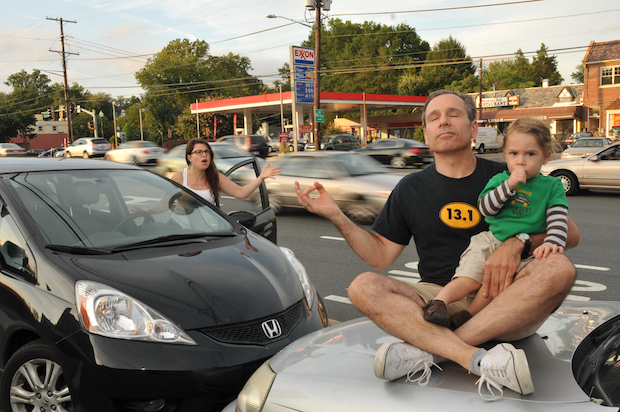Driving. That was one of the things I most dreaded when I married Liz and moved down to DC from Baltimore two years ago. I have my own issues with road rage, so I wasn’t looking forward to this region’s renowned traffic. I never imagined, though, that I would have to contend with DC’s other distinctions: A gold medal from an Allstate Insurance report about the nation’s worst drivers and a bronze from Travel and Leisure magazine for rudest city. Put them together, I’ve learned, and you’ve got a daily mash of macadam mania and animus that smacks of apocalypse now.
For two years, I have been negotiating Derby Dystopia, as I’ve come to think of local roadways, and up until now, it has only intensified my venom. But I should thank DC drivers. The motorists who are 112.1% more likely to get into an accident than the average American have unwittingly helped me do something I never thought possible—curb my own road rage.
When I first moved to the area, I was concerned that I might get myself or my family seriously injured on the road. At the very least, I worried that our toddler son, Macallah, might mimic the steady stream of invective spewed from behind the wheel. My road rage was just that bad. Even when Liz drove, I could barely contain myself; once I had to sit on my hands when the urge to push down Liz’s gas-pedal leg nearly overwhelmed me. A driver had suddenly appeared in the vanishing lane on Colesville Road and bullied her way into the merging lane, where we had been waiting—no blinker, no wave of thanks—nearly grazing our car. “Try visualization to calm yourself,” Liz said, ever evolved. I followed her advice, sort of: I visualized our headlights. Retrofitted with howitzers.
A psychologist once suggested that the road rage I’ve embraced since my 20s stems from taking other drivers’ misdirected aggression too personally. “It’s not about you,” she said. She was right. Mostly. This became clearer one morning when I was driving my 10-year-old stepdaughter, Aliya, to school in Northeast DC. She was learning about cultural conflict in school, and we were discussing the reasons behind King Philip’s War—a colonial conflict that occurred when Metacomet, sachem of the Massachusetts Wampanoags, lashed out against the Pilgrims’ land-grabbing descendants in an uprising that was doomed from the start. A woman in a Lexus swung from behind us on Sargent Road and passed us in the next lane over, the one intended for oncoming traffic. “See that?!” I screamed. “That’s a perfect example of what we’re talking about!” I sped up to catch the Lexus and saw it turn at the next traffic light. At the intersection, I struggled to open my window in time and from a slim crack yelled, “You—you Pilgrim!”
This was the source of my road rage: I was Metacomet. I didn’t care about personal trespasses. I cared about the larger, tribal ones. As I saw it, my rage bloomed into spear-waving stewardship. I needed to prevent these poachers, who believed that their private-property rights extended to the highway, from encroaching on the dwindling sanity and safety of our roads. It was the good fight, and it didn’t matter that mine was an ill-fated stand from the start. (The irony wasn’t lost on me. I knew full well that my vigilantism aped the corrosive antics of the very people I sought to rein in.)
For a long time, my Metacomet moments only deepened my resolve. Until recently. I was driving Macallah to his daycare provider’s home near Forest Glen, heading south on Georgia Avenue during morning rush hour. I signaled to turn left near the Woodside Deli and was met with a rash of blaring horns behind me. (I didn’t know that I couldn’t turn left from Georgia Avenue during rush hour.) I cleared my throat—something I do when I’m pressed for quick answers. Mistaking this for a cough, which warrants benediction in his two-year-old world, Macallah chirped “Blessh ouuu!”
The next thing I knew, a Ford SUV screeched up alongside us. It came to a stop, in the oncoming traffic lane, blocking my turn. I saw that it wasn’t a cop but another motorist, a balding, beefy guy with a beard. “Here we go,” I hissed, steeling myself. He screamed at me from behind his closed window, hands gesticulating violently. I rolled down my window, preparing for a clear verbal shot across my bow, and cleared my throat again. “Blessh ouuu!” Macallah chirped.
That was when a woman in a minivan appeared. Her van approached Beefy Guy head on and came to a stop—directly in front of his car. She, too, signaled to make a left-hand turn, essentially boxing him in. (The farcical skit was now complete.) Beefy Guy turned his rant toward the woman in the minivan, honking his horn, screaming and flailing about like some B-list silent-movie actor. At one point, he stopped ranting and looked my way, still from behind his closed window. In his window I saw our reflections: Superimposed over his flushed, seething face was my own face, stoic and serene.
Talk about a jarring moment.
For some reason I still don’t understand, I asked him a question, politely no less. “Am I not supposed to turn left here?” From behind his window, he continued to rant. Then he sped off. Apparently, the woman in the minivan had finally made her turn.
I made my turn, too, and heard Macallah sneeze through the bleating horns in our wake. “Blessh ouuu,” I said, relieved that this time my mimicry came from inside the car, rather than from outside of it.
When not taking to the warpath on local roads, Andrew Reiner teaches at Towson University, works on a collection of essays, and shamelessly moons over his two-year-old son. He, his wife, and their family live in Layhill.










